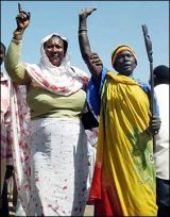Sudanese women demand role in new government
KHARTOUM, Jan 25 (Reuters) – Sudanese women activists on Tuesday demanded a role in the new peacetime government and positions on a commission which will write a constitution.

|
|
Sudanese women, one from the north (L) and one from the south hold hands as they chant ‘sawa, sawa’ (together) during celebrations in Khartoum, 01 January 2005. (AFP). |
Women hold few positions of power under the current government headed by President Omar Hassan al-Bashir, who took power in a military coup in 1989, despite the fact that more women are now working and obtaining higher education.
An agreement this month to end more than two decades of civil war in Sudan’s south raised hopes of a more representative government in Khartoum. But women say it is not enough.
“We (women) need to be part of the committee which will decide the constitution,” said Zeinab Bader el-Din, a member of an umbrella group of opposition parties.
“And we need to have gender issues put into the constitution,” she told a meeting of dozens of women activists from all parts of Sudan.
They will present to the United Nations, the government and the southern Sudanese ex-rebels a list of women they want to be included on six commissions which will create the new government, including the constitution.
The commissions, to be formed in the coming weeks, will include opposition political forces.
“It is very possible that some of our names can get on these lists if we lobby, lobby hard,” said university professor Amna Ahmed Rahma.
The Sudanese women’s emancipation movement enjoyed early success in the 1950s and 1960s, with women winning the vote soon after independence from Britain in 1956. But women say successive military dictatorships destroyed their momentum.
The activists said they would emphasise a paragraph in the power-sharing peace protocol which specifically grants equal rights for men and women.
Swanee Hunt, a former U.S. ambassador and head of the organisation Women Waging Peace, told the meeting women should use the upcoming Sudan donors conference in Norway to demand that gender issues be included in all parts of the discussions.
She cited the Tokyo conference on the reconstruction of Afghanistan as an example of how women’s rights were tabled.
